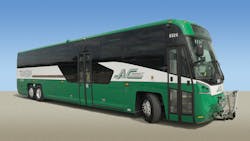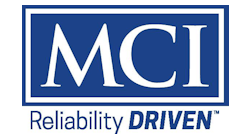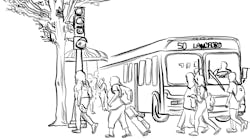The Alameda-Contra Costa Transit District (AC Transit) has launched the Transbay MCI D45 CRT LE a new bus designed by Motor Coach Industries (MCI). Also known as Transbay MCI, the bus features a blend of sustainability, advanced technology and passenger comfort.
"The Transbay MCI represents a departure from the norm, and by launching this revolutionary new fleet of buses, our transit district is seamlessly combining safety measures with captivating design elements. This bus was years in development and, unfortunately, delayed by COVID-induced supply chain issues. Now that it is here, I am confident the Transbay MCI will transform how we commute across San Francisco Bay and chart a new path for an inclusive experience for all riders," said Joel Young, AC Transit Board president.
AC Transit has a history of collaborating with disabled riders. The agency launched the Accessibility Advisory Committee in 1991, which now operates as the General Manager's Access Committee (GMAC).
The GMAC thoroughly examined every aspect of the Transbay MCI Prototype, including hip-to-knee room and narrow seats, excessively reclining seats, a narrow aisle with potential risks at the second set of stairs, inadequate space for luggage and roll bags and the need for handrails along the top and both sides of the rear staircase, especially for individuals with visual impairments or limited arm mobility. The committee's keen insights were sent to the manufacturer's design engineers for changes to amenities and accessibility features.
"The result is a light-filled and low-floor vestibule that is revolutionary in design and breaking barriers for wheelchair accessibility," says Michael Hursh, AC Transit general manager. "The stylized vestibule prioritizes ease of boarding through an all-new mid-cabin door, a wider and brawny ADA ramp, enhanced space for maneuverability, one-touch automated securement and it is built to accommodate the future design of manual or powered wheelchairs, as well as scooters."
Another onboard ADA innovation is the Quantum Wheelchair Securement Station from Q’Straint). The intelligent technology gives mobility riders complete independence to secure themselves. The mobility rider centers their wheelchair or scooter against the padded backrest, presses the ADA-friendly button to start the automatic locking sequence and the Quantum arms safely secure the wheelchair in place – typically in less than 25 seconds. The bus operator releases the Quantum from the operator's dashboard control, and the rider can independently exit the bus.
The Transbay MCI features 52 seats with embedded headrests, jetliner-styled LED lighting, riders control cabin airflow through overhead air vents and stop request buttons are accessible to each passenger in the overhead panel. Two doors and staircases – front and mid-cabin – lead to a broader center aisle with integrated overhead grab rails that increase onboard safety. Each seat's armrest is fully collapsible by depressing a single release button. Also, like jetliners, the overhead parcel rack stows away packages or bags and creates more legroom.
The Transbay MCI features three-point seatbelts. The Transbay MCI complies with the state of California's Vehicle Code § 27318, which requires bus passengers who are 16 years of age or older to be properly restrained by a seatbelt whenever riding. An easy-to-use three-position bike rack mounted on the front of the Transbay MCI enhances access to work, shopping, services, family and friends.
The new Transbay MCI surpasses California's Vehicle Omnibus Regulation (Omnibus Regulation). The Omnibus Regulation, adopted to cut smog-forming nitrogen oxides (NOx) from conventional heavy-duty engines, became effective in December 2021. The agency notes the Transbay MCI produces less emissions than most hybrid cars.
AC Transit will roll out the new MCI fleet in timed phases. The first 18 coaches will launch into revenue service on Transbay Lines E, F, G, J and L. The fleet will ultimately total 36 coaches.


